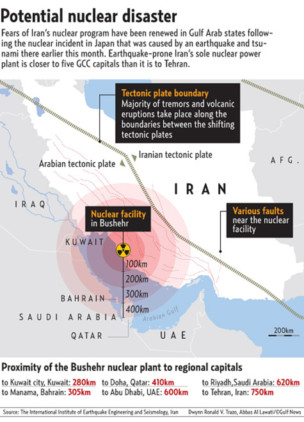
Manama: Kuwait’s former foreign minister Shaikh Mohammad Sabah Al Salem Al Sabah has stressed that potable water in Kuwait was a vital issue and called for Iranian nuclear reactors to be placed under international supervision for safety purposes.
“While other countries may have springs, all of our water comes from the sea, so we have to be very careful and seriously concerned about the Arabian Gulf waters,” Shaikh Mohammad, member of the UN-affiliated Elders’ Council, said. “The peaceful nature of the Iranian nuclear programme does not mean that there is no possibility that a leakage may occur and contaminate the Arabian Gulf waters,” he said as he delivered a lecture in Muharraq, Bahrain’s second largest city.
The former foreign minister stressed the significance of being cautious as Kuwait is the nearest to the Iranian Bushehr nuclear power plant, saying that three of the most advanced nations had witnessed accidents at nuclear sites.
“The US had the Three Mile Island issue, while the former Soviet Union had the Chernobyl incident and Japan had the Fukushima nuclear plant disaster. There is no guarantee that a similar incident will not hit the Bushehr plant and contaminate the Gulf waters.
“Kuwait entirely depends on the Gulf waters and any nuclear contamination of these waters will result in depriving the country of its source of water,” he said.
Five of the six GCC capitals are closer to the Bushehr plant than Iran’s capital Tehran.
Kuwait had to struggle to cleanse its environment when the occupation forces of Iraq set afire its oil installations in the 1990s, he said.
Kuwait, along with the other Gulf Cooperation Council (GCC) states, have repeatedly expressed concern at safety of the Iranian Bushehr nuclear plant.
Referring in his lecture to sustainable development, Shaikh Mohammad said the issue affected regional and international security.
Each country of the world is facing mounting and complex challenges in the sectors of energy, food and water security, in addition to natural disasters, draught and famine, the former foreign minister said.
The United Nations can play a major role in tackling such crises, he said as he stressed the need for taking measures to avert environmental catastrophes.
Shaikh Mohammad cautioned that current policies implemented by some nations would lead to further economic instability, slow growth and deepening flaws in states’ economic structures.
“The world population is forecast to grow from 7.2 billion to 11 billion in two decades’ time,” he said, quoted by Kuwait News Agency (Kuna). “Such a dramatic increase in the number of earth inhabitants will be particularly in the south and therefore problems such as poverty and hunger would deepen.”
Such challenges and problems can be dealt with by means of development in the information, communication, alternative energy and hereditary engineering, he said.










